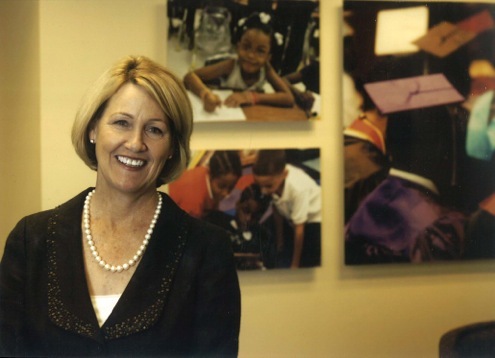By: Katie Belk Morris
Is change always about tearing down what's wrong?
A few of years ago when I was asked that question, I immediately answered, YES. I thought that change was moving from the bad to what is right or good.
Today, I disagree. Now I believe that change is about building upon the good. It is about identifying what is already working to create something even better. Through serving as the chair of our family foundation, I have found that change is realizing that in order to affect the very complex social issues of our day, we can't be satisfied with "just okay."
Endowed grantmaking foundations are an interesting lot. We have virtually no competitors or market forces pushing us to be better. The drive for improvement must come from within. For us at The Belk Foundation, that journey started with some seemingly simple yet eye-opening questions. After over 80 years as a foundation with a broad mission, we finally asked ourselves: "What has been our legacy as a foundation to date? Our measurable impact so far? What has changed in the world as a result of our grants?"
No one liked the answer we found: We didn't really know what our impact was. Since 1928, the foundation had spent more than $60 million to support organizations doing important work in our community. But when we looked across our somewhat scattered investments, we weren't quite sure what social change they had actually accomplished. Once we realized that we did not know exactly what impact we were having, we knew we had to change.
I have always liked the quote from Maya Angelou: "Now that I know better, I do better." The foundation had to do things differently -- not because we had been wrong in the past, but because we knew that there was a real opportunity to create a bigger impact moving forward.
As a start, instead of considering every proposal that came to our doorstep, we decided to narrow our focus areas and zero in on a pressing need in the communities we serve. For us, the answer was K-12 public education: an area of critical need today that also harkened to our family foundation's values and historical giving. After several years of learning through this approach, we narrowed our mission again to focus on two issues with compelling evidence of affecting student success: the quality of teachers and leaders and a solid base of achievement by the third grade. This did not mean that other issues in our community were not as important; rather it meant that with issues so large and complex, we had to focus in on areas where we felt our grantmaking could garner the most traction given our limited resources.
Next, we discovered that our funding alone just was not enough to affect real change. We had overlooked two particularly powerful tools: advocacy and coalition-building. In the past, we had never thought about using our own voice as a foundation to further our mission. We shied away from attention or public statements. Looking back on it now, I realize what a missed opportunity that approach was. Recently, the foundation has slowly stepped out and taken a few risks in using our voice. We have worked to showcase new ways of creating teacher career pathways in North Carolina. In early grade achievement, we have helped to spearhead a coalition of leaders working to increase summer learning opportunities as well as a group of leaders pushing to improve third grade reading proficiency. Partnerships have sharpened our ideas, forced us to consider new ways of approaching problems, and magnified our impact in education.
Nothing was wrong about the way our family foundation had worked in the past. It was doing good, but the opportunity to do even more was too compelling to overlook. We needed to hone our mission, focus in the key areas where we could have the deepest impact, and multiply our work by engaging with others. Change was a risk for us. But taking that risk has led to smarter investments, ones that have potential to change a system, rather than only affecting one program or child.
We had to leave behind the comfortable in order to create positive change and deeper social impact. The process is not over; our search for more impact continues. But every day, we focus our energy on building upon what is good.
These themes will be addressed in more detail through the Pioneers for Change Fellowship kicking off on March 23 and 24, 2015 in London. Pioneers for Change is an initiative of Adessy Associates.
About Katie Belk Morris
Katie B. Morris serves as board chair of The Belk Foundation, a family foundation based in Charlotte, N.C. Under her leadership, the organization has redefined its mission to focus on providing quality education for children and youth, hired full-time professional staff and increased community accessibility and awareness of The Foundation. She also serves as a trustee of The John M. Belk Endowment, which focuses on post-secondary degree obtainment for underserved populations.

